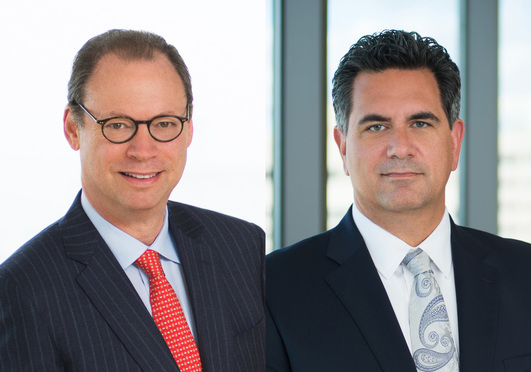Rent-A-Wreck Crash Into Bankruptcy Dismissed for Lack of Good-Faith Filing
The U.S. Bankruptcy Code provides distressed companies an array of tools to reorganize their business affairs and restructure their debt.
March 06, 2018 at 02:42 PM
10 minute read

The U.S. Bankruptcy Code provides distressed companies an array of tools to reorganize their business affairs and restructure their debt. These powers include, among other things, the imposition of the automatic stay, centralizing most disputes in the bankruptcy court, the ability to sell assets free and clear of interests, the ability to reject burdensome contracts, and the authority to obtain a discharge if the debtor complies with the code's requirements. However, not everyone is entitled to file a bankruptcy case and obtain access to such relief. To utilize the process, a debtor must file the case in good faith. The term “good faith” is not defined in the code. Courts have interpreted good faith to mean the case must have a valid reorganization purpose. This issue was addressed in a recent decision issued on Feb. 13, by U.S. Bankruptcy Judge Laurie Selber Silverstein of the District of Delaware in In re Rent-A-Wreck of America, Case No. 17-11592. In a detailed 36-page opinion that thoroughly reviewed the record and case decisions regarding the good-faith requirement, the court held the debtors were not in financial distress at the time of the filing and filed the cases as part of a continuing two-party dispute with a franchisee, and directed dismissal of the cases for lack of good faith.
The Dispute
The opinion details a decade-long dispute between the debtors in the cases, Rent-A-Wreck of America Inc. (RAWA) and its wholly owned subsidiary, Bundy American (Bundy, and together with RAWA, the debtors), and David Schwartz, the founder and prior owner of Bundy Rent-A-Wreck. Schwartz first started using that name in 1973 in connection with his car sales business in Los Angeles. There was no formal franchise agreement between RAWA and Schwartz. RAWA thereafter went public. At the time of the opinion, there were 76 Rent-A-Wreck franchises in 28 states, plus operations in St. Maarten and Scandinavia. In addition, Bundy had between four and six nondebtor subsidiaries that operated rental franchises and related businesses.
RAWA was acquired by J.J.F. Management Services Inc. in 2006 when JJFMS purchased all outstanding RAWA stock and took RAWA private. At the time of issuance of the opinion, RAWA was part of a group of private companies owned by JJFMS. JJFMS's primary principal, John J. Fitzgerald Jr., was an owner, the president, CEO, and chairman of the JJFMS board of directors, and director and chairman of RAWA's board of directors.
After the sale closed, RAWA wrote Schwartz demanding that he either provide evidence of a franchise agreement or that he stop holding himself out as a RAWA franchisee. In June 2007, Schwartz sued RAWA, Bundy, and JJFMS in the U.S. District Court for the District of Maryland, seeking a declaratory judgment that Schwartz had a royalty-free Rent-A-Wreck franchise pursuant to a 1985 agreement or, alternatively, that he had an implied-in-fact contract based on a course of conduct between 1977 and 2007. RAWA and Bundy counterclaimed, seeking a declaration that any franchise agreement could be terminated or was an unlawful restraint on trade. After two jury trials, motions for judgment notwithstanding the verdict, and two decisions issued by the U.S. Court of Appeals for the Fourth Circuit on appeal, it was adjudicated that Schwartz did indeed hold an implied-in-fact royalty and fee-free franchise agreement to run a Rent-A-Wreck used car rental business in West Los Angeles for his lifetime. The precise terms of the contract were left for further negotiation or litigation. RAWA was later held in contempt by the Maryland court for intentionally diverting prospective customers from Schwartz's business when RAWA's call center told prospective customers that there was no franchise in Los Angeles. The court's opinion states that the Maryland court observed in one of its opinions that Fitzgerald proclaimed at the outset of the litigation the he would make Schwartz “sweat at virtually every stage of the proceedings.”
On July 24, 2017, approximately one month after RAWA was held in contempt of the Maryland court's order, the debtors filed their Chapter 11 bankruptcy cases. The debtors filed a motion to reject seven franchise contracts, including the “implied” agreement with Schwartz. Schwartz then filed an objection to the motion to reject and a motion to dismiss the bankruptcy cases, asserting the filings were merely a continuation of the Maryland court litigation.
Filings Lacked Good Faith
The court began its analysis by noting that a Chapter 11 bankruptcy case may be dismissed for cause, including a lack of good faith. While there is no definitive list of factors relevant to a good-faith determination, Third Circuit decisions focus on two inquiries: whether the petition serves a valid bankruptcy purpose by preserving a growing concern or maximizing the value of the debtor's estate, and whether the petition is filed to obtain a tactical advantage. The court wrote that the Court of Appeals for the Third Circuit has made it clear that: “A debtor's desire to invoke the powers conferred by the Bankruptcy Code does not establish good faith, nor does it constitute a valid bankruptcy purpose. … If it did, any entity willing to bear the cost of a bankruptcy filing could use the Bankruptcy Code's redistributive mechanisms to its advantage, a concept 'antithetical to the structure and purposes of the Bankruptcy Code.' The ability to use the redistributive provisions of the Bankruptcy Code assumes the existence of a valid bankruptcy, 'which, in turn, assumes a debtor in financial distress.'”
An analysis of financial distress is a fact-specific inquiry. Courts consider such factors as solvency; cash reserves; recent financial performance and profitability; the proportion of debt owed to insiders; realistic estimates of actual or likely liability; the threat of litigation; whether a debt is fixed, substantial, and imminent; current cash position or current liquidity; ability to raise capital; and overdue debts or the ability to pay debts as they come due.
The opinion reviews the record in detail, including testimony presented by the debtors during a two-day hearing and the debtors' filings and submissions. The court found that the debtors failed to establish they were in financial distress. Testimony by the debtors' representatives stated the debtors did not file their cases because they were insolvent, or in an attempt to restructure their unsecured debt. The court noted that the debtors did not believe they had the burden to show they were in financial distress as an element of good faith, but only that they had a valid reorganization purpose. The court found the debtors did not file the cases because they were insolvent, because of their unsecured or secured debts, or because they could not pay their debts as they matured. Their only outstanding secured debt was to affiliate JJFMS, which had matured in 2011 and never been declared in default. There was little debt owed to nonaffiliated JJFMS entities, and while the debtors' schedules listed liabilities in excess of their assets, they listed the value of their primary assets, the trademarks, as “unknown.” The debtors did not offer testimony that they could not pay their debts as they came due.
Turning to other factors, the court concluded the cases were filed to obtain a tactical advantage in the debtors' litigation with Schwartz. Specifically, the court found that the debtors' primary purpose for the filings was to reject Schwartz's franchise agreement so the debtors could take over the Los Angeles territory to pursue multiple royalty-paying franchises. The debtors argued that the Third Circuit decision in Integrated Telecom, 384 F.3d 108 (2004), a leading decision that dismissed a bankruptcy filing by a solvent debtor, held that financially troubled companies may use bankruptcy to stay in business or create or preserve some value that would otherwise be lost outside of bankruptcy. The court disagreed and noted that the Third Circuit also observed in that decision bankruptcy may not be used to simply redistribute estate value from one stakeholder to another. The good-faith inquiry must address attempts to distribute value from a creditor to a company's shareholders. Here, the court found the purpose of the bankruptcy cases was to redistribute value—the Rent-A-Wreck trademark and goodwill in the Los Angeles area—from Schwartz to Bundy. In light of the debtors' financial affairs and debt, the primary, if not sole beneficiaries of the transfer of that value would be JJFMS and Fitzgerald, not the creditors of the debtors' estates.
The court also concluded that bankruptcy would not accomplish the goals of a good-faith bankruptcy filing. The debtors did not require bankruptcy to restructure their balance sheet or to manage their debt to JJFMS and their affiliates. The opinion states that based on the record, the court rejected the argument that other burdensome franchise agreements needed to be rejected, and found such rejections would be just an ancillary benefit to the filings. The debtors had made no attempts to cut expenses, refinance debt, sell assets, expand into other territories, or otherwise improve profitability.
The court ultimately concluded that while this situation did not present the classic “two party dispute,” it certainly resembled one. The court granted Schwartz's motion to dismiss.
Conclusion
About 10 years ago, a number of solvent debtors filed bankruptcy cases with the sole objective of rejecting significant real estate leases and benefiting from the Bankruptcy's Code's cap on landlord real estate lease rejection claims. At that time, numerous decisions were issued by bankruptcy and appellate courts rejecting the idea that the bankruptcy process can be used by nonfinancially or artificially distressed debtors to strip rights and claims of a creditor and transfer that value to one or more shareholders. In fact, one of the authors represented the landlord in one such case—In re Liberate, cited in the court's opinion. This case presented a situation where the bankruptcy court reviewed the history of the dispute and the debtors' case filings and testimony, and concluded the debtors were attempting improperly to use the bankruptcy process as a sword rather than a shield. In this case, this kind of sword was held not to be available as a tool in the reconstructing toolbox. As the court concluded in its opinion: “These bankruptcy petitions fall on the dark side of the spectrum ranging from the clearly acceptable to the patently abusive.” The debtors have filed a motion for reconsideration of the court's order dismissing the cases, so the litigation continues.
Andrew C. Kassner is the chairman and chief executive officer of Drinker Biddle & Reath, a national law firm with more than 635 lawyers in 12 offices. He chaired the corporate restructuring group for almost 20 years. He can be reached at [email protected] or 215-988-2554.
Joseph N. Argentina Jr. is an associate in the firm's corporate restructuring practice group in the Philadelphia and Wilmington, Delaware, offices. He can be reached at [email protected] or 215-988-2541.
This content has been archived. It is available through our partners, LexisNexis® and Bloomberg Law.
To view this content, please continue to their sites.
Not a Lexis Subscriber?
Subscribe Now
Not a Bloomberg Law Subscriber?
Subscribe Now
NOT FOR REPRINT
© 2025 ALM Global, LLC, All Rights Reserved. Request academic re-use from www.copyright.com. All other uses, submit a request to [email protected]. For more information visit Asset & Logo Licensing.
You Might Like
View All

'In Re King': One Is Definitely the Loneliest Number When Filing an Involuntary Petition
7 minute read
Delaying Rent Payment by Assisted Living and Skilled Nursing Facilities in Chapter 11
7 minute readTrending Stories
- 1Public Notices/Calendars
- 2Wednesday Newspaper
- 3Decision of the Day: Qui Tam Relators Do Not Plausibly Claim Firm Avoided Tax Obligations Through Visa Applications, Circuit Finds
- 4Judicial Ethics Opinion 24-116
- 5Big Law Firms Sheppard Mullin, Morgan Lewis and Baker Botts Add Partners in Houston
Who Got The Work
J. Brugh Lower of Gibbons has entered an appearance for industrial equipment supplier Devco Corporation in a pending trademark infringement lawsuit. The suit, accusing the defendant of selling knock-off Graco products, was filed Dec. 18 in New Jersey District Court by Rivkin Radler on behalf of Graco Inc. and Graco Minnesota. The case, assigned to U.S. District Judge Zahid N. Quraishi, is 3:24-cv-11294, Graco Inc. et al v. Devco Corporation.
Who Got The Work
Rebecca Maller-Stein and Kent A. Yalowitz of Arnold & Porter Kaye Scholer have entered their appearances for Hanaco Venture Capital and its executives, Lior Prosor and David Frankel, in a pending securities lawsuit. The action, filed on Dec. 24 in New York Southern District Court by Zell, Aron & Co. on behalf of Goldeneye Advisors, accuses the defendants of negligently and fraudulently managing the plaintiff's $1 million investment. The case, assigned to U.S. District Judge Vernon S. Broderick, is 1:24-cv-09918, Goldeneye Advisors, LLC v. Hanaco Venture Capital, Ltd. et al.
Who Got The Work
Attorneys from A&O Shearman has stepped in as defense counsel for Toronto-Dominion Bank and other defendants in a pending securities class action. The suit, filed Dec. 11 in New York Southern District Court by Bleichmar Fonti & Auld, accuses the defendants of concealing the bank's 'pervasive' deficiencies in regards to its compliance with the Bank Secrecy Act and the quality of its anti-money laundering controls. The case, assigned to U.S. District Judge Arun Subramanian, is 1:24-cv-09445, Gonzalez v. The Toronto-Dominion Bank et al.
Who Got The Work
Crown Castle International, a Pennsylvania company providing shared communications infrastructure, has turned to Luke D. Wolf of Gordon Rees Scully Mansukhani to fend off a pending breach-of-contract lawsuit. The court action, filed Nov. 25 in Michigan Eastern District Court by Hooper Hathaway PC on behalf of The Town Residences LLC, accuses Crown Castle of failing to transfer approximately $30,000 in utility payments from T-Mobile in breach of a roof-top lease and assignment agreement. The case, assigned to U.S. District Judge Susan K. Declercq, is 2:24-cv-13131, The Town Residences LLC v. T-Mobile US, Inc. et al.
Who Got The Work
Wilfred P. Coronato and Daniel M. Schwartz of McCarter & English have stepped in as defense counsel to Electrolux Home Products Inc. in a pending product liability lawsuit. The court action, filed Nov. 26 in New York Eastern District Court by Poulos Lopiccolo PC and Nagel Rice LLP on behalf of David Stern, alleges that the defendant's refrigerators’ drawers and shelving repeatedly break and fall apart within months after purchase. The case, assigned to U.S. District Judge Joan M. Azrack, is 2:24-cv-08204, Stern v. Electrolux Home Products, Inc.
Featured Firms
Law Offices of Gary Martin Hays & Associates, P.C.
(470) 294-1674
Law Offices of Mark E. Salomone
(857) 444-6468
Smith & Hassler
(713) 739-1250






